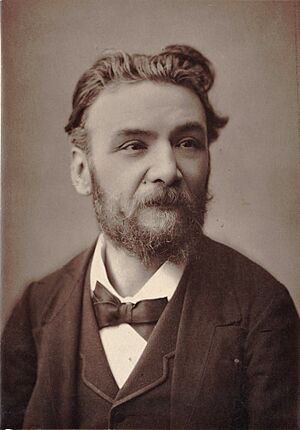Ernest Guiraud facts for kids
Ernest Guiraud (born June 23, 1837 – died May 6, 1892) was a French composer and music teacher. He was born in America. He is most famous for writing the orchestral parts (called recitatives) for two very well-known operas: Carmen by Georges Bizet and Les contes d'Hoffmann (The Tales of Hoffmann) by Jacques Offenbach.
Contents
Early Life and Education
Ernest Guiraud was born in New Orleans, Louisiana, in the United States. His father, Jean-Baptiste-Louis Guiraud, was also a musician and taught Ernest when he was young. His father had won a famous French music award called the Prix de Rome in 1827.
When Ernest was 15, he wrote music for a full opera called David. He and his father found the story for this opera during a trip to Paris. David was a big success when it was performed in New Orleans in 1853. This success helped Ernest decide to become a composer.
In December 1853, Guiraud traveled to France to continue his music studies. He learned to play the piano from Antoine François Marmontel and studied composition (how to write music) with Fromental Halévy at the Paris Conservatoire. He was a very talented student. In 1858, he won first prize for piano. The next year, he won the Prix de Rome, just like his father. This was special because it was the only time both a father and son won this award. He also became good friends with other famous composers like Camille Saint-Saëns and Georges Bizet.
Composing and War Service
Guiraud started his career by writing short operas. These were often played before a main show. His first important work was Sylvie, which opened in Paris in 1864. It was very popular and made him well-known.
In August 1870, the Franco-Prussian War began. Paris was greatly affected. Guiraud's opera-ballet Le Kobold had just started its run when all the theaters closed. Guiraud joined the army and fought for France until the war ended in 1871.
Later Career and Famous Works
Ernest Guiraud loved writing operas, but most of his own operas were not big hits. Madame Turlupin (1872) was respected but had an old-fashioned story. His opera Piccolino (1876) was the highlight of his career. It included a beautiful song and a lively ballet. This helped the opera run for a long time, but it was never performed again after its first run.
Guiraud is probably most famous for helping other composers. After Bizet died, Guiraud organized Bizet's music. He created L'Arlésienne Suite No. 2 and two Carmen Suites from Bizet's opera Carmen. He also wrote the recitatives (spoken parts set to music) for Carmen. These recitatives replaced the original spoken dialogue and were used in performances for over a hundred years.
Guiraud also finished Jacques Offenbach's famous opera Les contes d'Hoffmann (The Tales of Hoffmann). Offenbach died before he could finish it. Guiraud's version of this opera became very popular.
Teaching and Influence
Guiraud's own musical works are not many. This might be because he spent a lot of time helping his friends and teaching. Some of his other well-known works include the ballet Le Forgeron de Gretna Green (1873) and a symphonic poem called Chasse fantastique (1887).
In 1876, Guiraud started teaching at the Paris Conservatoire. He was also a founder of the Société Nationale de Musique, a group that supported French music. In 1891, he became a member of the Académie des Beaux-Arts and a professor of composition at the Conservatoire.
Guiraud's teaching methods for harmony and orchestration were highly respected. He had a strong influence on many students, including the famous composer Claude Debussy. Other notable students included Paul Dukas and Erik Satie.
Guiraud spent his last years, 1891 and 1892, finishing the music for Kassya, a five-act opera by Léo Delibes. However, Guiraud himself died in Paris at age 54 before he could complete it.
Operas
- David, opera (3 acts), first performed (f.p.) April 14, 1853, Théâtre d'Orléans, New Orleans, USA.
- Gli avventurieri, melodrama giocoso (1 act), written 1861, never performed.
- Sylvie, opéra comique (1 act), f.p. May 11, 1864, Opéra-Comique, Paris.
- Le Coupe du roi de Thulé, opera (3 acts), written 1869-69, never performed.
- En prison, opéra comique (1 act), f.p. March 5, 1869, Théâtre Lyrique, Paris.
- Le Kobold, opéra-ballet (1 act), f.p. July 26, 1870, Opéra-Comique, Paris.
- Madame Turlupin, opéra comique (2 acts), f.p. November 23, 1872, Théâtre de l'Athénée, Paris.
- Piccolino, opéra comique (3 acts), f.p. April 11, 1876, Opéra-Comique, Paris.
- Le Feu, opera, incomplete, f.p. March 9, 1879, Paris.
- Galante Aventure, opéra comique (3 acts), f.p. March 23, 1882, Opéra-Comique, Paris.
- Le Baron Frick, operetta in 1 act (1885), written with other composers.
- Frédégonde, lyric drama (5 acts), incomplete; finished by Paul Dukas and Camille Saint-Saëns; f.p. December 18, 1895, Opéra at the Palais Garnier, Paris.
See also
 In Spanish: Ernest Guiraud para niños
In Spanish: Ernest Guiraud para niños


